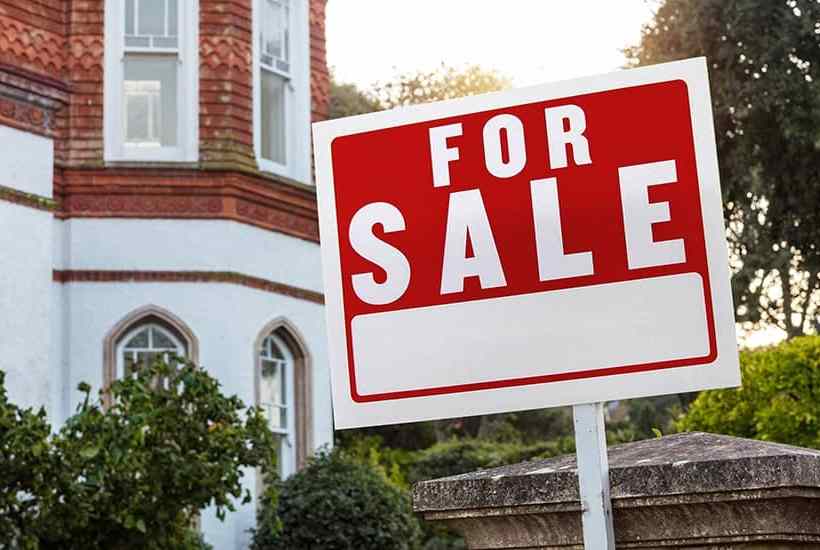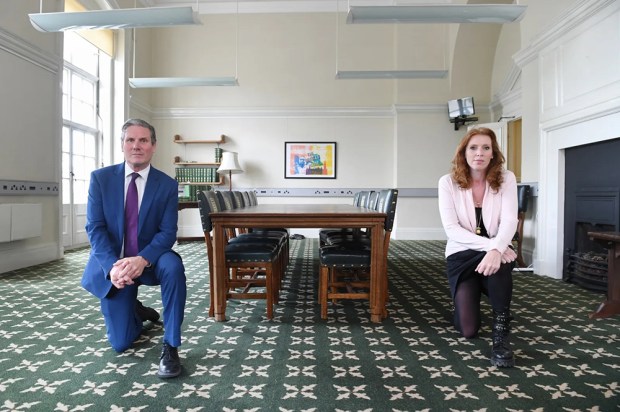I must offer my support to Luke Main and Dr Joanna Brunker, who as a consequence of their fervent Christian beliefs refused to sell their house in Surrey to a gay couple. It shows a certain principle, no? I recently sold my house in Kent and being a Christian should really have made a similar sort of stipulation — but the truth is that such is my avarice I’d have flogged the property to the campest old queen in the country if he’d offered a few quid over the asking price. As it happens, we did discriminate against some potential purchasers, by taking against them because they were down from London, or neurotic, or had loathsome children. But then I believe the law allows one to do that. Casual, irrational hatred based on the flimsiest of pretexts is fine; but not an objection — politely expressed — rooted in 2,000 years of Christian belief, in a nominally Christian country.
My only question to Mr Main and Dr Brunker (are they living in sin or what?) is that if they are ill-disposed towards homosexuals, why have they been living in such a gay-looking house? I don’t know whether you’ve seen the pictures. Cute little cottage down a back lane with rainbow foliage all over it and sweet dinky-looking windows. It couldn’t be gayer if, upon the approach of potential purchasers, it leapt up and began singing ‘I Will Survive’. Then again, perhaps this is the reason they are now selling it — because they were hitherto unaware that the house looked gay. Perhaps they discovered this fact only on the way home from evensong accompanied by fellow worshippers.
‘You live there, in that house? Oh dear me!’
‘Why? What on earth is wrong with it? What makes it so funny?’
‘Oh, nothing, nothing. It’s just, if you don’t mind my saying so, it looks as if it bats for the other side, so to speak. No offence.’
For the journos who covered this little story (which resulted in Mr Main and Dr Brunker being summarily dumped by their terrified estate agents), the whole thing brought to mind those Proddy bakers in Northern Ireland who refused to ice a cake with a message supportive of gay marriage for a homosexual couple. The bakers have been vindicated by the courts. Yet this case is not quite the same. The bakers were on much more solid ground because they were able to argue that they should not be required by law to write something which contravened their religious beliefs — and were supported on that basis by the eminent and rather wonderful gay rights campaigner Peter Tatchell.
Main and Brunker had no such recourse, which is why, for me, they recalled the Robert Relf imbroglio from 1976 which I well remember. Mr Relf put a sign outside his house in Leamington Spa alerting people to the fact that it was ‘For sale — to an English family only’. He was found to have breached the Race Relations Act and was imprisoned for contempt of court when he refused to take the sign down. Relf portrayed himself as an ordinary, honest, Brummie bus driver who had been in the military but had no great political axe to grind — which was not entirely true as he’d been a member of just about every mentalist far-right Neo-Nazi political group in existence.
Again, though, the case was not quite the same. Relf was discriminating against people simply because of the colour of their skin, rather than because of something more essential. Main and Brunker would undoubtedly aver that they would not wish to be accessories to people whose actions would lead to them being burned for eternity in the cleansing fires of hell while being relentlessly goaded by Satan’s homophobic and energetic imps. Relf did not have that recourse: he was simply a racist.
And yet I still find myself on the side of the unquestionably repulsive Relf — as was most of the UK at the time — even if he brought back echoes from those hideous days of boarding houses with their signs saying ‘No Irish, No Blacks, No Dogs’. The problem is the degree to which supposedly progressive legislation impinges directly upon an individual’s human rights. In short, it is a question of where the line is drawn between the machinations of the state and the behaviour of the individual. It seems to me that an individual should be allowed to sell his house to whoever the hell he likes and for whatever reasons he likes, even if this standpoint of mine is made easier to rationalise by the vast size of the housing market: there are plenty more fish in the sea, etc.
It is perhaps true that the Relf case is slightly more complicated than that. The belligerent little Nazi could easily have sold his house to whoever the hell he liked without having that grandstanding sign outside his front door. In other words, his prime concern was to make a political statement and with the expectation that he would fall foul of the law in doing so. But still, I have the inescapable feeling that he was within his rights — as would a Muslim be who did not wish to sell his house to a Christian.
But what about landlords? Should they have the right to discriminate when allocating tenancies? Buy-to-let landlord Fergus Wilson made it a policy not to rent his properties to — as he put it — ‘Pakistanis and Indians… because of the curry smell’. The Equalities and Human Rights Commission took him to court in 2017 and won, perhaps helped in doing so by Wilson’s insistence that he was only joking.
My suspicion is that legislating against the irrational hatred of the individual tends, in the end, to cause more rancour than it assuages. Try to police people’s minds and we all end up in trouble.
Got something to add? Join the discussion and comment below.
Get 10 issues for just $10
Subscribe to The Spectator Australia today for the next 10 magazine issues, plus full online access, for just $10.
You might disagree with half of it, but you’ll enjoy reading all of it. Try your first month for free, then just $2 a week for the remainder of your first year.















Comments
Don't miss out
Join the conversation with other Spectator Australia readers. Subscribe to leave a comment.
SUBSCRIBEAlready a subscriber? Log in